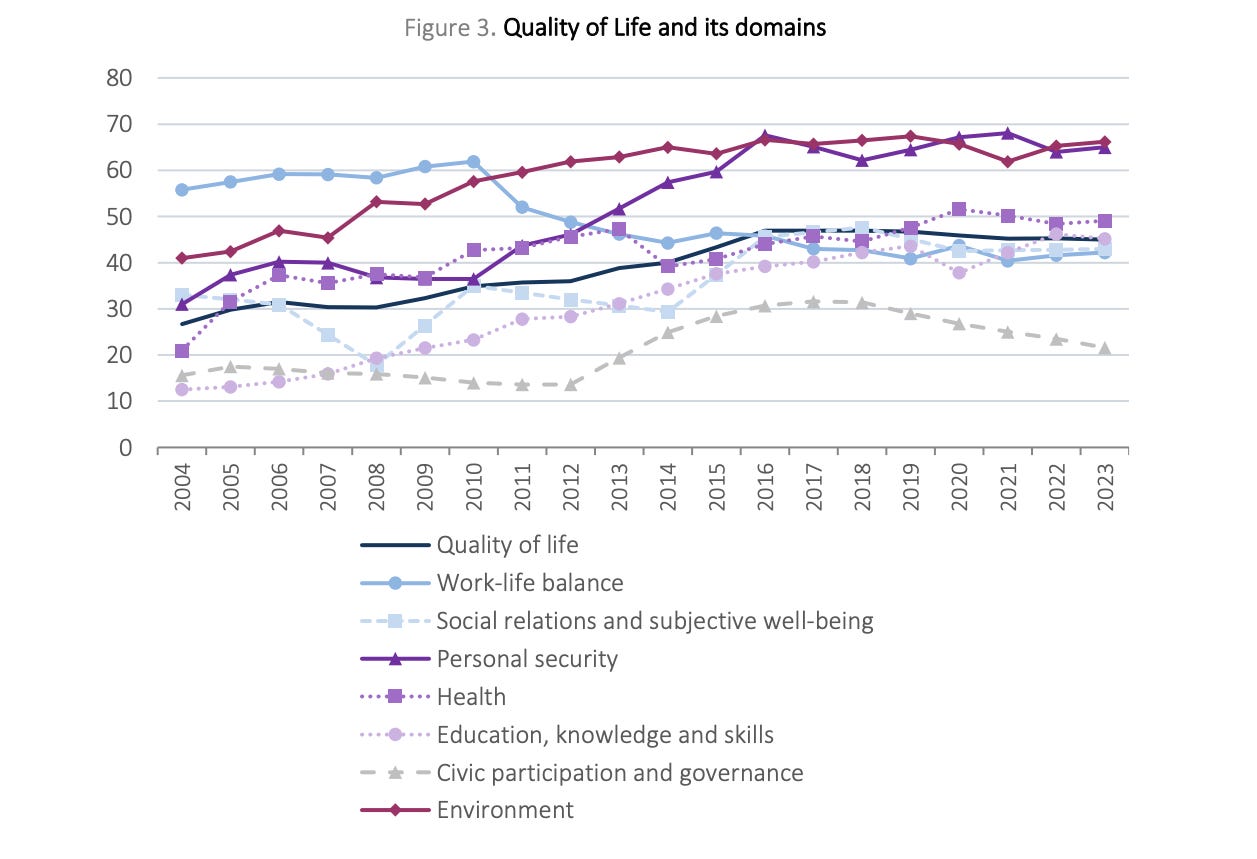Portuguese Well-Being Index rises
The factors that showed the most favourable evolution were personal security, education, knowledge and skills, and economic well-being.

What?
On Monday, the National Statistics Institute (INE) released preliminary data from the 2023 Well-being Index (WBI), pointing to an improvement from 2022.
The overall index, which reflects the evolution of the population’s well-being, is now close to pre-pandemic levels.
Eight of the ten areas that make up the WBI showed a positive evolution from 2004 to 2023. The factors that showed the most favourable evolution were personal security, education, knowledge and skills, and economic well-being.
However, the two perspectives of well-being under analysis – represented by the synthetic indices of Material Living Conditions and Quality of Life – showed different behaviours: while the underlying index of Material Living Conditions increased, the underleying Quality of Life decreased from 2022.
The Quality of Life index was always higher than Material Living Conditions, except for 2009 and from 2021 onwards.
Global analysis
With the exception of 2020, the Well-being Index in Portugal has grown continuously since 2012.
In 2020, which was marked by the COVID-19 pandemic, the index recorded a decrease of 1.5 percentage points (p.p.) compared to the previous year, even lower than in 2012 (2.0 p.p.).
Nevertheless, between 2004 and 2023, the WBI went from 22.7 to 46.0, primarily due to the progress observed in Material Living Conditions.
Material Living Conditions
The underlying index of Material Living Conditions has three domains:
Economic vulnerability
Economic well-being
Employment
All three domains saw improvements compared to 2022. This improvement was more pronounced for the “Economic vulnerability” domain than the other two domains.
Historically, the “Economic well-being” shows an approximately linear positive evolution, having grown almost continuously since 2004 (only with a slight exception in 2010-2012 and 2019-2020).
In turn, the “Economic vulnerability” and “Employment” domains showed similar patterns throughout the period: a sharp decrease until 2013, an increase from that year until 2019 and a recovery at the end of the period, after the decrease in 2020.
Quality of life
The underlying index of Quality of Life has seven domains:
Work-life balance
Social relations and subjective well-being
Personal security,
Health
Education, knowledge and skills
Civic participation and Governance
Environment
The data shows that public opinion on healthcare and governance has worsened significantly since 2017.
The decline in trust was especially stark in the realm of public service quality (not shown in the graph above) which reached a historic low, with a rating of just 13 points out of 100, almost ten points lower than in 2022.
This marks the lowest score in 15 years, a period that spans back to 2008.
Though the pandemic had previously seen a rise in positive perceptions of services, this trend has reversed, with services such as healthcare facing particularly harsh evaluations.
The INE noted a continuous decrease in civic participation since 2017, a trend that mirrors the decline in voter turnout, which hit new lows in comparison to peer countries. For 2023, no data is available, as no elections took place in the past year.
On a more positive note, personal security was one of the most improved domains, with trust in the police reaching an all-time high of 49.2 points. This marks a stark contrast to previous years, with satisfaction with crime rates also showing growth, although it remained higher in 2022 than in 2023.
Finally, from 2012 onwards, the Environment and Personal security domains have recorded the highest values of the Quality of Life index, thus reflecting Portugal's relevant position in these areas internationally






